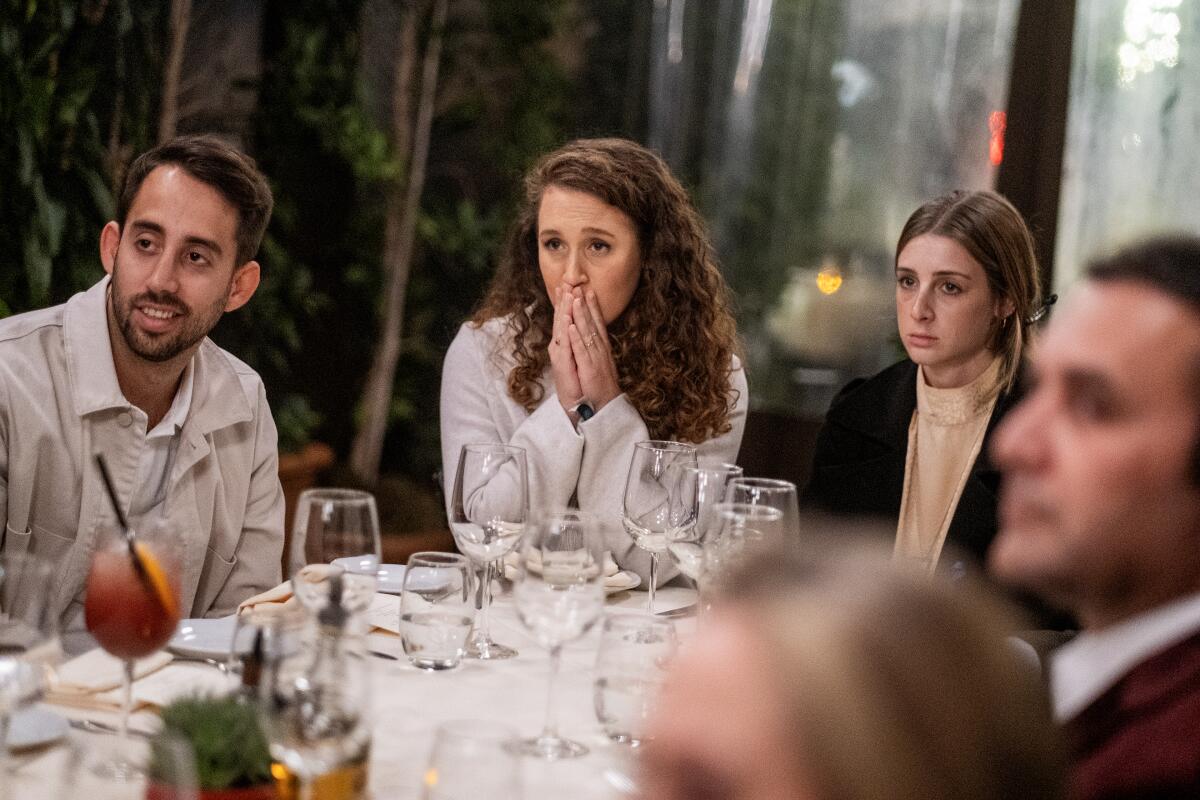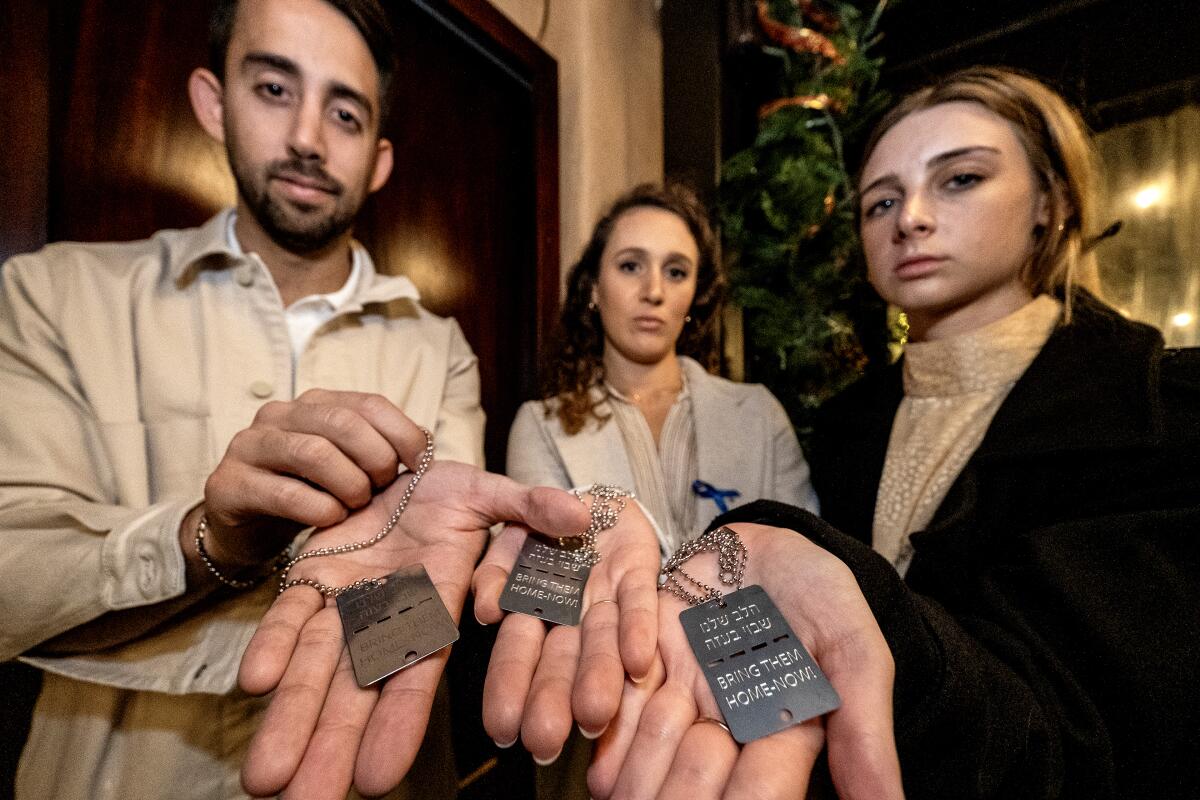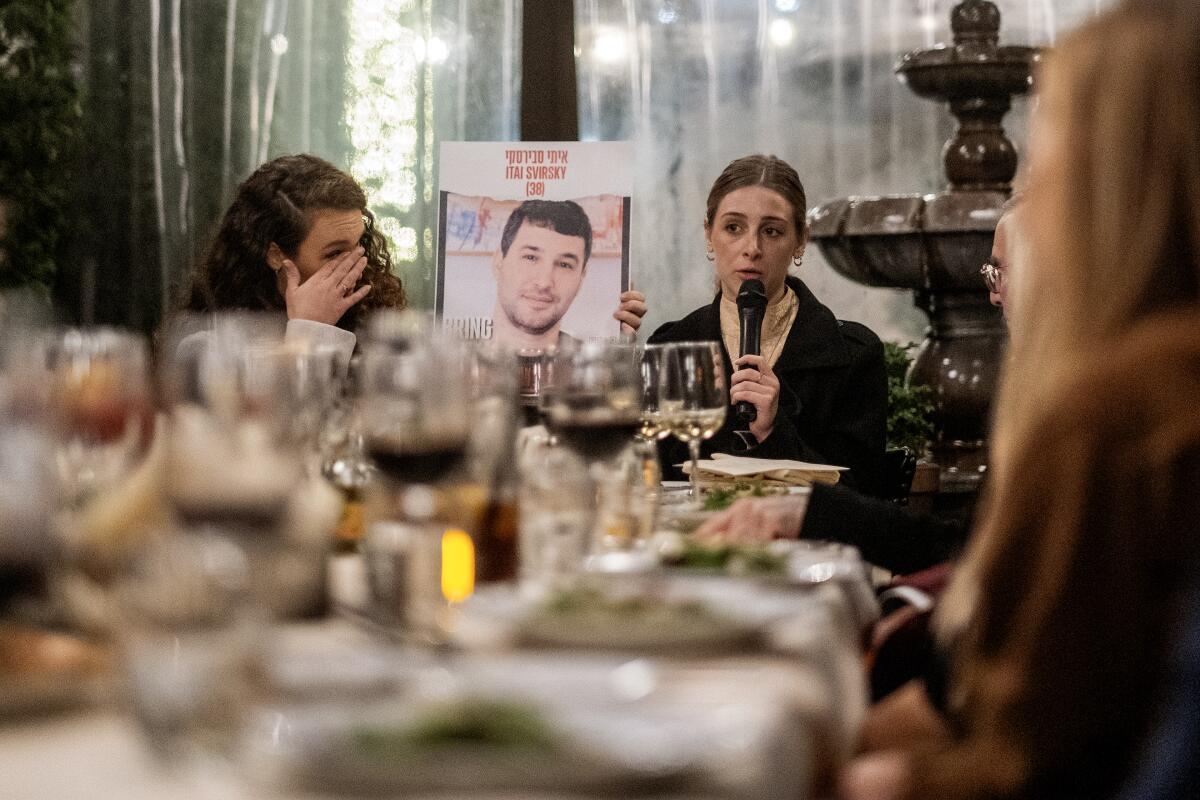-
San Diego sheriff: Migrants did not try to forcefully stop school bus - August 31, 2024
-
One stabbed, another injured in altercation on L.A. Metro bus - August 31, 2024
-
Trump Judge Has ‘Two Options’ as Future of Case Unclear: Analyst - August 31, 2024
-
What to Know About Putin’s Planned Visit to Mongolia Amid ICC Arrest Warrant - August 31, 2024
-
Buying sex from a minor could be a felony under bill headed to Newsom - August 31, 2024
-
Democrat Lawmaker Switches Party to Become Republican - August 31, 2024
-
Misdated Mail-In Ballots Should Still Count, Pennsylvania Court Rules - August 31, 2024
-
Cause and manner of death determined for Lucy-Bleu Knight - August 31, 2024
-
NASCAR Craftsman Truck Series Announces Return To Iconic Circuit In 2025 - August 31, 2024
-
At Pennsylvania Rally, Trump Tries to Explain Arlington Cemetery Clash - August 31, 2024
‘Our heart is captive in Gaza’: Families of Israeli hostages plead for return of loved ones
At 6:30 a.m. on Oct. 7, the piercing sound of sirens woke up Naama Weinberg in her Tel Aviv apartment. As she always did when sirens warned of an incoming missile attack, she immediately checked her family’s WhatsApp group chat for messages from relatives living in a kibbutz near the Gaza border.
“Please pray for us,” her aunt wrote, describing the sounds of screaming and shooting.
Then a red heart emoji.
Then silence.

Itay Raviv, left, and sisters Naama and Ofir Weinberg attend a dinner in Beverly Hills to share the stories of relatives who are being held hostage by Hamas.
(Ringo Chiu / For The Times)
Weinberg, 27, would later learn from Israeli government officials that her aunt, Orit Svirsky, was murdered that day — shot while hiding under blankets — during the attack by Hamas militants. Her uncle, Rafi Svirsky, was found dead in a nearby house with his three golden retrievers, all shot. Her 97-year-old grandmother, Aviva Sela, somehow survived, but the body of Gracie Cabrera, her longtime caretaker from the Philippines, was found mutilated near the home.
Her cousin, 38-year-old Itay Svirsky, was gone. The family was told by Israeli government officials that Svirsky was kidnapped and is being held by Hamas somewhere in Gaza.
And he remains in captivity — failing to win release in the exchange of Israeli hostages for Palestinian prisoners during a weeklong cease-fire that began Nov. 24. So far, Hamas has released about 105 hostages — most of them Israeli women and children — and still holds about 135. Israel has released about 240 prisoners.
Weinberg and her sister Ofir, 24, came to Los Angeles last week to share their story about the attack on Oct. 7, which killed at least 1,200 Israelis — the deadliest assault in the nation’s 75-year history. More than 15,500 Palestinians in Gaza have been killed during Israel’s retaliatory strikes, according to the Hamas-run health ministry.
The Weinbergs came to urge the world not to forget their cousin and the other hostages who remain in Hamas’ hands. They were joined by Itay Raviv, whose great-uncle, 78-year-old Avraham Munder, remains a hostage; all three spoke at a dinner in Beverly Hills on Saturday with representatives of the American Jewish Committee and other supporters of Israel.
Raviv, 27, and the Weinbergs asked the dinner guests to do one thing to help the hostages — appeal to elected officials, share a social media post, contact nonprofits and charities. They shared photos of their relatives and the necklaces they carry with them inscribed with the phrase in Hebrew, “Our heart is captive in Gaza,” and, in English: “Bring them home now!”
The family believes Svirsky is still alive, based on accounts of hostages who saw him before they were released. They said he had not been physically harmed but was under extreme mental duress because Hamas captors were telling hostages that Israel had been destroyed, they had no home to return to and no one was fighting for them. His relatives also live with the daily fear that he could be executed while in captivity.

Itay Raviv, left, and siblings Naama and Ofir Weinberg show necklaces inscribed with the phrase in Hebrew, “Our heart is captive in Gaza,” and, in English: “Bring them home now!”
(Ringo Chiu / For The Times)
“We are very worried that the damage could be irreversible,” Ofir Weinberg said. “That is why the clock is ticking.”
Three of Raviv’s relatives — his great-aunt Ruthi Munder, her daughter Keren Munder and 9-year-old grandson Ohad Munder-Zichri — were released as part of the hostage deal. But their house in the Nir Oz kibbutz in southern Israel less than a mile from the Gaza Strip was partly burned, Raviv said.
Raviv said his relatives were not beaten and managed to survive on meager portions of rice and bread. They told him they were moved from place to place — sometimes to below-ground tunnels — and slept on the ground without the ability to wash. He considers his family lucky for being able to reunite with three of his relatives — but he worries constantly about his great uncle, who walks with a cane and suffered bruises falling off a motorcycle during his abduction, according to reports from released hostages who saw him during captivity.
“He doesn’t have that much time,” Raviv said. “He will not be able to survive. Even though some hostages were released, we must do everything in our power to speak out. I’m not a politician. I don’t know what the best solution is. I just know that they need to be out.”
Raviv and the Weinbergs said their relatives had sought to live in peace with their Palestinian neighbors — collecting monthly donations for those who used to work in the kibbutz but no longer could after Israel withdrew from Gaza in 2005. The Weinbergs’ aunt, Orit Svirsky, had attended an international women’s peace conference three days before she was murdered. Raviv said his great-uncle, in his younger days, would volunteer to drive Palestinians north to Israel for medical care.
Itay, the sisters said, had started work as a “life coach” focusing on mental health after studying philosophy, psychology and economics. He loved guitar and yoga and grew up in the Be’eri kibbutz, co-founded by her grandparents 77 years ago in southern Israel near the Gaza Strip. Her grandparents, whose family had escaped the pogroms of Russia in the early 20th century, started the kibbutz as a lifelong mission to create a communal, safe place for Jewish people in Israel, she said.
Despite the decades of bloodshed and bitterness, the young Israelis say they refuse to give up their dream of peace.
“It’s really hard to imagine right now, but I still believe the conflict can be solved with words and without violence,” Ofir Weinberg said, referring to understandings with the broader Palestinian people and not Hamas.
“I understand the Palestinian people should stay. I recognize this is their home,” she said. “I just want us to coexist in peace.”

Naama Weinberg, left, holds a picture of her cousin Itay Svirsky, who is a hostage in Gaza, as her sister Ofir shares her story during a dinner in Beverly Hills.
(Ringo Chiu / For The Times)
For now, however, Weinberg said her world has narrowed to one overriding goal: to see the return of her cousin. She has stopped her studies and taken time off from a part-time job at a prominent Israeli tech firm. She has put off a vacation to the Philippines with her partner. She’s moved back home to stay with her parents, who are building a small unit in their garden for Weinberg’s grandmother to live.
Her only dream now is to see her cousin alive, sitting with their grandmother and sharing their favorite treat: a cup of cold coffee with a scoop of ice cream.
Source link













